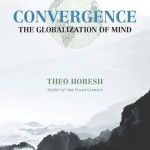Theo H oresh is a Boulder social entrepreneur, philosopher and a familiar face in the integral community. Last year Theo published a series of insightful essays on the Middle East, inspired by his time spent with the Palestinians and the Yazidi refugees. I invited him over to talk about his travels, only to find out that he has also released a new book on a broader topic: Convergence: The Globalization of Mind.
oresh is a Boulder social entrepreneur, philosopher and a familiar face in the integral community. Last year Theo published a series of insightful essays on the Middle East, inspired by his time spent with the Palestinians and the Yazidi refugees. I invited him over to talk about his travels, only to find out that he has also released a new book on a broader topic: Convergence: The Globalization of Mind.
I enjoyed our conversation, and hope you do, too. Theo and I talked about his travels, and his heart-to-heart connections with people under siege, particularly with the youth in whom he finds much to admire. We talked about how these kinds of connections — in both real space and virtual space — can bring on a more worldcentric mind for all involved.
Excerpt: If you see more you’ve got to be responsible for more
There are many examples of how this is already happening—the internet, international agreements and cooperation, travel and communication. But in a world where entire cultures span multiple levels of development, gaining consensus about what we can create, and how, can be a tricky proposition. The feeling of being overwhelmed is prevalent, as first tier structures of consciousness are mostly motivated by fear. How does integral theory transcend this thinking, and help us think about these vastly complex systems?
Listen as Theo discusses how each of us can call forth a worldcentric mind, so we can be a more awake and effective as we become more plugged-in and connected.
Global consciousness did not simply arise from seeing the world from outer space or from some mass of the population attaining certain spiritual states. It has taken a long process of social evolution, which has been supported by a wide array of institutional and technological developments, to produce global consciousness. Like the nationalism of the 20th century, it is a consciousness suited to a new form of human organization. We are globally conscious because global consciousness is needed to comprehend the world in which we reside. Without it we would be lost in spaciousness.
~From “Convergence: The Globalization of Mind” by Theo Horesh
Podcast: Download
Subscribe: Google Podcasts | RSS






